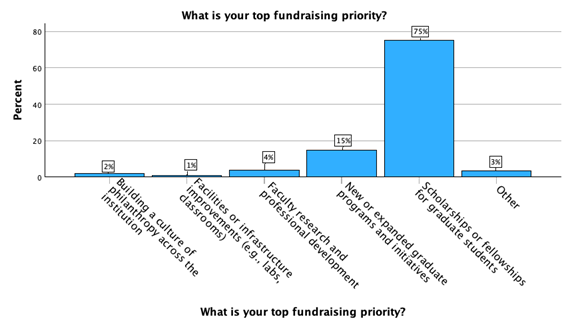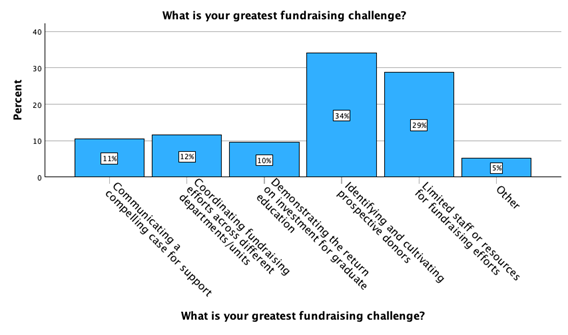Getting Started with Fundraising for Graduate Education: A Practical Guide for Graduate Leaders
In today’s climate of uncertain public funding and increasing demand for student support, graduate education leaders must think creatively about how to secure new resources. While the concept of “fundraising” might feel outside the typical graduate dean’s comfort zone, a recent CGS webinar I had the pleasure of moderating showed that strategic, mission-driven fundraising is not only accessible—it’s essential. To best support fellow graduate education leaders, I thought I would share insights gleaned from the webinar in this blog post.
The webinar proved popular with the CGS membership. Over 200 individuals representing 166 unique graduate institutions registered for the 90-minute conversation, including representatives from Ivy League schools to public land-grant institutions and master’s focused institutions. Pre-webinar polling highlighted the widespread commitment—and challenges—graduate leaders face in fundraising. As seen in the charts below, registrants clearly conveyed the contours of the challenge:


These results paint a clear picture: while there’s strong commitment across our institutions to prioritize fundraising for graduate student support, many of us are navigating this work without dedicated resources or clear strategies—often facing the dual challenge of limited staffing and difficulty engaging potential donors. Whether you’re a seasoned fundraiser or just beginning, here are five tips drawn from a dynamic conversation between graduate deans and advancement professionals from across the country.
Start Where You Are—Even If It’s with Nothing
Nicole Lounsbury, Director of the Graduate School at South Dakota State University, offered a powerful reminder: “Just start.” When she realized that existing graduate awards were no longer funded, she and her small team launched a grassroots crowdfunding campaign—without a dedicated development officer or communications staff. The results were immediate and inspiring. By tapping into the talent already within her office and leveraging social media and student stories, she built momentum that now supports student travel, awards, and access scholarships.
Her advice? “Assess what you already have—whether it’s photos, alumni stories, or student videos—and use that to build your message.”
Fundraising Is about Relationships, Not Just ‘The Ask’
For many graduate deans, the biggest misconception is that fundraising is all about making a bold financial ask. But in my experience, the most generous donors often don’t need a hard pitch—they just need to be invited into the story.
Effective fundraising begins with cultivating authentic relationships with stakeholders who care about graduate students: alumni, faculty, community members, industry leaders. Show them how graduate education connects to research, workforce development, and community impact. Help them see themselves in the mission—and the funding will follow.
Collaborate Instead of Compete
One barrier to success is the assumption that fundraising for graduate education means competing with other schools or units. John Loftus, Assistant Dean of Development at UC Santa Barbara, called this the “me vs. we” mindset—and cautioned against it.
Instead of competing with academic deans for donors, he built a collaborative fundraising model. Through UCSB’s Fellowship Accelerator program, graduate division funds matched donations to support graduate fellowships across campus. The result? Over $6.5 million raised in new endowments in just a few years—without fighting over credit or dollars.
Know What You Need—and Be Ready to Say It
Before you can inspire others to give, you need to clearly articulate what you’re fundraising for. Is it summer support for students in the humanities? Dissertation fellowships? A dedicated space for graduate student life?
Michele Siegal, Director of Development and Alumni Relations at the University of Michigan’s Rackham Graduate School, emphasized the importance of being “campaign-ready.” That means understanding what funding priorities align with donor interests, knowing the cost of a fellowship or travel award, and being prepared with specific giving levels and impact stories.
As she put it, “If a donor asked what they could do to help, would you know what to say?”
Student Stories Are Your Greatest Asset
Across the board, the most compelling fundraising messages were rooted in student experiences. Videos, testimonials, and storytelling were central to every successful campaign. Students are the best ambassadors for graduate education—they show the transformative power of your programs.
Nicole’s team, for example, built light-hearted, low-budget video content that featured students sharing their impact in agriculture, research, and community development. The result? Increased visibility, growing donor interest, and a loyal base of supporters who now associate graduate education with innovation and humanity.
Bonus: Use a Fundraising Toolkit and Lean on Your Network
For those just starting out, a fundraising toolkit shared during the webinar offers tested strategies to help graduate leaders frame priorities, identify donors, and build long-term relationships.
Fundraising doesn’t have to be intimidating. As the panelists shared, you don’t need a charismatic personality or a large budget. What you do need is passion, a plan, and a willingness to collaborate across your institution and beyond.
Post questions for your colleagues and contribute to the conversation using the Fundraising for Graduate Education thread on the CGS Dean’s Discussion Board. Following the webinar, Michele Siegal recently answered questions posed by graduate leaders.
Final Thought: Fundraising Is Advocacy
Fundraising is not a distraction from your role as a graduate dean—it’s an extension of it. It’s how you champion student success, invest in faculty mentorship, and build the future of graduate education at your institution.
So don’t wait for the perfect moment or the perfect donor. As one panelist put it, “Be bold. Be clear. And just get started.” CGS members can view the full webinar, slides and shared resources here.
Dr. Emory H. Woodard IV is Dean of Graduate Studies at the College of Liberal Arts and Sciences, Villanova University, and Chair of the CGS Advancement Advisory Committee.
